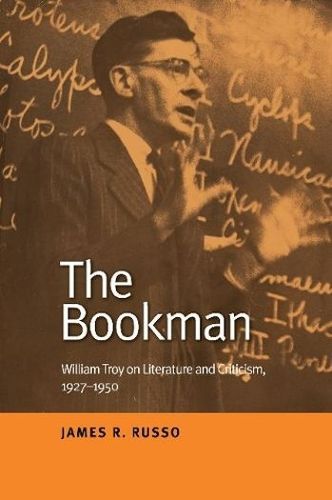Readings Newsletter
Become a Readings Member to make your shopping experience even easier.
Sign in or sign up for free!
You’re not far away from qualifying for FREE standard shipping within Australia
You’ve qualified for FREE standard shipping within Australia
The cart is loading…






William Troy (1903-1961) was a highly regarded literary critic during the 1930s and 1940s. Among his contemporaries, he ranked with Edmund Wilson, Kenneth Burke, and F. O. Matthiessen. Indeed, in the preface to the posthumous, 1968 publication of his Selected Essays, which won a National Book Award, Allen Tate placed Troy among the handful of the best critics of this century. Troys criticism was informed by an intelligence so balanced that, where many theoreticians took up positions in logical traps, he easily avoided them. At the very moment when scholars and critics were either treating literature like polemics or investigating ideas as if belles-lettres were a sub-category of history or philosophy, Troy acknowledged both the centrality of literary ideas and their distinction from ideas in other forms. When confronted with a text, he analysed it with a firm sense of its inherent meaning and of its cultural implications, in a style that expresses seriousness of commitment precisely and clearly. The Bookman presents a selection of Troys remaining writings on such major literary figures as Henry James, e. e. cummings, Ernest Hemingway, Edith Wharton, F. Scott Fitzgerald, T. S. Eliot, Andre Gide, William Faulkner, James Joyce, Albert Camus, Jean Cocteau, Willa Cather, W. H. Auden, Virginia Woolf, and Emile Zola. Troy produced a body of work that is timeless, permanent, and exemplary – perhaps as much as, if not more so than, the work of such other critical contemporaries of his as the Anglo-Americans Yvor Winters, I. A. Richards, William Empson, George Jean Nathan, and R. P. Blackmur. Published in conjunction with Film Nation: William Troy on the Cinema, 19331935 (ISBN 978-1-78976-173-3), The Bookman is clear evidence of Troys role as one of the foremost critics of his age. Inclusion of a substantive index makes the work an essential and accessible gateway to a wide range of literary criticism.
$9.00 standard shipping within Australia
FREE standard shipping within Australia for orders over $100.00
Express & International shipping calculated at checkout
William Troy (1903-1961) was a highly regarded literary critic during the 1930s and 1940s. Among his contemporaries, he ranked with Edmund Wilson, Kenneth Burke, and F. O. Matthiessen. Indeed, in the preface to the posthumous, 1968 publication of his Selected Essays, which won a National Book Award, Allen Tate placed Troy among the handful of the best critics of this century. Troys criticism was informed by an intelligence so balanced that, where many theoreticians took up positions in logical traps, he easily avoided them. At the very moment when scholars and critics were either treating literature like polemics or investigating ideas as if belles-lettres were a sub-category of history or philosophy, Troy acknowledged both the centrality of literary ideas and their distinction from ideas in other forms. When confronted with a text, he analysed it with a firm sense of its inherent meaning and of its cultural implications, in a style that expresses seriousness of commitment precisely and clearly. The Bookman presents a selection of Troys remaining writings on such major literary figures as Henry James, e. e. cummings, Ernest Hemingway, Edith Wharton, F. Scott Fitzgerald, T. S. Eliot, Andre Gide, William Faulkner, James Joyce, Albert Camus, Jean Cocteau, Willa Cather, W. H. Auden, Virginia Woolf, and Emile Zola. Troy produced a body of work that is timeless, permanent, and exemplary – perhaps as much as, if not more so than, the work of such other critical contemporaries of his as the Anglo-Americans Yvor Winters, I. A. Richards, William Empson, George Jean Nathan, and R. P. Blackmur. Published in conjunction with Film Nation: William Troy on the Cinema, 19331935 (ISBN 978-1-78976-173-3), The Bookman is clear evidence of Troys role as one of the foremost critics of his age. Inclusion of a substantive index makes the work an essential and accessible gateway to a wide range of literary criticism.